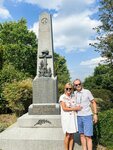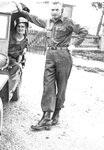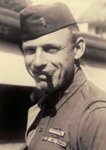


Growing up as a Southern Baptist, Carol Walton remembers the sound of her daddy’s strong bass voice in the church choir and the smell of her mother’s Sunday pot roast.
The family attended morning and evening services on the Lord’s Day, with fellowship often extended to church members’ homes after worship services.
Everywhere Carol’s family lived — Albuquerque, Oklahoma City, Lawton — her daddy, World War II veteran Samuel Tilden Hastings, Jr., served the church he was a member of as a deacon, a Sunday School teacher, and a member of the choir.
“In the Garden,” “How Great Thou Art,” and “I Know Whom I Have Believed” were his favorite hymns.
Gone 20 years now, Sam is remembered by Carol and her husband Maurice as a good man for whom many descriptions applied. Hard-headed. Strong. Humble. Loyal. Dutiful. Compassionate and caring, with a distinctive laugh and a strong sense of right and wrong.
There is memorabilia related to Sam in the home near the Granbury Square where they have lived since shortly after his death.
For example, there is the “map bag” he used after becoming an intelligence officer. It contains maps with some of his handwritten notes.
And there is a favorite photo of him dressed in uniform, grinning, a cigar dangling from the corner of his mouth, looking as if he had been sent from Central Casting to play the role of a soldier who would strike fear in the heart of any foe.
In July, Carol and Maurice paid Sam the honor of retracing his wartime steps.
They did it with the help of Maurice’s niece Zoe Ellen Azzi and her husband David Azzi. Both are schoolteachers in the Dallas area and were the perfect guides for the trip the Waltons took with nine other couples, seven of them from Granbury.
Zoe Ellen teaches history at Trinity Christian Academy and routinely travels with groups of students. David teaches at Prestonwood Christian Academy and speaks French.
During the 13-day trip, Carol and Maurice visited places such as Utah Beach, Omaha Beach, and the Normandy American Cemetery.
“We were disappointed that we didn’t really get to see hedgerows when we went over,” Carol said. “He always spoke a lot about how difficult it was fighting in the hedgerows.”
Hedgerows were big mounds of dirt with trees and brush where enemy soldiers could easily hide.
Couples in the entourage sometimes did their own thing, and on one particular day Carol and Maurice traveled with local developer Ike Thomas and his wife Trisha to a small village where during WWII a plane piloted by Ike’s uncle Willard was shot down.
According to Carol, Willard was captured by the Germans and sent to a Prisoner of War camp for two years.
For reasons that are unclear to the travelers, people of that village in 1997 erected a monument in honor of Willard and his crew members.
The trip wasn’t solely World War II-focused. The couples visited The Louvre in Paris and attended a performance of “Hamilton” in London.
It was a fun and meaningful trip that the Waltons weren’t able to take all those years when Maurice was working as an attorney.
When Carol mentioned to Zoe Ellen in 2019 that she and Maurice were thinking of making such a trip when Maurice retired, Zoe Ellen offered to take them.
“She’s coordinating the buses, the different trains,” Maurice said. “The coordination of the whole trip was just unbelievable.”
Referring to Zoe Ellen, Carol said, “We had to remind her sometimes that we were 70, not 17, because she was used to having to keep teenagers occupied at all hours.”
During World War II, Sam was a first lieutenant and then an intelligence officer. He was wounded twice and at one point spent six weeks in a tent hospital before returning to his company.
Sam landed as a replacement on Utah Beach on July 12, 1944, the month after D-Day. He joined Company G of the 2nd Battalion, 329th infantry as platoon leader.
During his time of service, Sam was part of what was known as the “Rag-Tag Circus.” He helped take Luxemburg and fought in the Battle of Hurtgen Forest and in the Battle of the Bulge.
Over the years — for decades — Sam hardly ever spoke about the war or the role he played in it, even though his service to his country earned him a Silver Star, two Purple Hearts and two Bronze Stars.
However, in his later years, an invitation by Zoe Ellen to speak to her students in Dallas caused him to open up a bit more.
On March 5, 2002, less than three months before his death, Sam agreed to sit down with his grandson Austin, Carol and Maurice’s son, for a two-hour videotaped interview.
In a segment of that video, Sam, recounted his hardest day of battle — Aug. 5, 1944. His platoon had been given a mission to clear Germans out of Chateauneuf-d’lll-et-Vilaine, France, so that U.S. tanks could move through to Saint-Malo.
Sam’s actions that day earned him a Silver Star medal, the United States Armed Forces’ third-highest military decoration for valor in combat.
Sam and his men had to cross 500 yards of open ground where there were fences, foxholes, and machine gun nests. They took out several of those nests and chased Germans from houses but doing so came at a cost.
Sam started the day with 40 men in his platoon. He ended it with 16.
MAN OF FEW WORDS
The night before embarking on the mission, three of the young men in Sam’s platoon told him that they knew they would not survive the day but that they would go as far as they could.
“I was just about a complete failure,” Sam said about that night, when he was just one month past his 22nd birthday. “I couldn’t think.”
Carol said that her father was likely suffering from Battle Fatigue, an acute stress reaction experienced by soldiers who have seen intense combat.
Sam said that he prayed and asked God to make him calm.
“And He did,” he said.
Sam counseled the soldiers and read the New Testament with them.
The next day, all three men died in battle.
One of the men initially was mildly wounded in the check by a shell fragment but when Sam told him to go to an aid station, the soldier refused, saying that “a little thing like that” wouldn’t hurt him.
“And he got up to go through a barbed wire fence and he got a bullet right there, right in his head,” Sam said, pointing to the middle of his forehead.
Off camera, Austin tried to coax his grandfather into talking about his experience fighting face to face with enemy soldiers.
He mentioned that the paperwork pertaining to Sam’s Silver Star refers to hand-to-hand combat.
“That’s what it says,” Sam said.
“Are saying you didn’t do that, or…?” Austin prompted.
Sam’s reply was succinct.
“No,” he said. “I didn’t say that.”
TOUGH BUT TENDER
Sam grew up on a farm in Cranfills Gap. He went to Tarleton, then to Texas A&M University, Class of ‘44.
He met Janice, a Baylor University graduate, who was the roommate of his cousin.
In March 1943, while at A&M, Sam and other young men were notified that they were being sent to Officer Candidates School. He and Janice had been on just one date.
After the war ended, Sam returned home shortly before Thanksgiving in November 1945. He took a train from New York to Dallas, then took a taxi to Clifton, where Janice was living in a rooming house.
He took her on a date to Waco to watch the Texas-A&M football game. He asked her to marry him.
The couple married on July 27, 1946.
Sam settled into family life and worked for Sentury Insurance for 30 years.
The man who had engaged in fierce hand-to-hand combat was somehow very good at tying bows on his little girls’ dresses.
“He could make a beautiful bow,” Carol recalled.
Carol saw her father cry just one time, and it had nothing to do with the trauma of war. It happened during the 1960s, when Carol’s older sister Joyce became a hippie and hitchhiked to California.
“It was on her birthday and he just broke down at the dinner table,” Carol said.
That was before Maurice’s time with the family, but he noted that while Sam wasn’t one to display emotions, he was “very tender with our kids.”
Maurice and Carol have three other sons besides Austin: Hastings and twins Griffin and Graham.
Griffin and his family live in Hood County. His wife Maggie is principal at Acton Elementary School.
Maurice said that Sam loved assembling Christmas toys for his grandsons and taking care of jobs that Carol wanted done around the house.
“He was the kind of guy who could do anything,” Carol said.
Carol recalls that even after the war, Sam maintained an interest in maps and atlases.
“He always had a recliner and he’d have maps, atlases, he was an atlas maniac,” she said. “Now, knowing what he did in the war makes sense. He always had maps around and if there was something on the news, he was going to find out where that was on the map.”
In 1995, when Griffin and Graham were in the sixth grade, Sam and Janice moved to Granbury from Oklahoma. They became members of First Baptist Church. Of course, Sam became a deacon there.
When Carol and Maurice decided to build a house, the one they live in now, Carol was commuting to work in Southlake. Every day, Sam would bring his lawn chair and talk to the crew as they worked.
“He thoroughly enjoyed it and they thoroughly enjoyed him. He wasn’t being tacky about it,” Carol said.
On May 31, 2002, while the house was still under construction, Sam suffered a fatal heart attack. He was just shy of his 80th birthday.
He had heart problems, Carol said, which she attributes to smoking, a habit that he and so many other soldiers took up during the war.
In summing up her father, Carol said, “He was the greatest part of the Greatest Generation, and I think the Greatest Generation is an apt term for all those men because they went and served their country. They did their duty, and he did it because it was his duty.
“He came back and started a life with mother and he raised kids. (The war) was part of his past, he just didn’t let it become who he was. But, to me, he was a hero.”